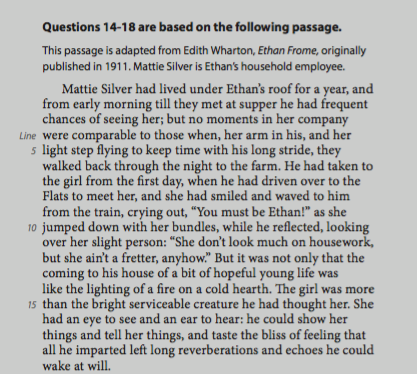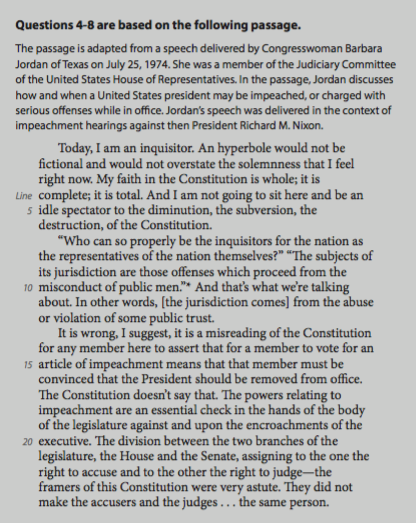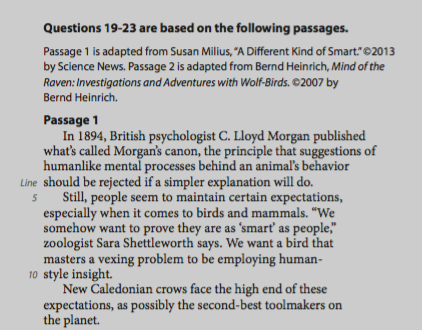What are the SAT Reading Test Questions Like?
5 min read•july 11, 2024
Debdutta Mandal
Debdutta Mandal
SAT 🎓
62 resourcesSee Units
The Reading test is one of the two tests in the SAT's Evidence-Based Reading and Writing Section. The reading test aims to measure a student’s ability to comprehend what they read. The section is comprised of 52 multiple-choice questions distributed among 5 passages. Students are allotted 65 minutes to complete this portion of the test.
📚 Types of Passages
Each passage in the Reading test is between 500-700 words and the complexity of the passages varies.
📖 The Literature Passage
There is always a passage from a classic or contemporary piece of U.S. or World Literature. Oftentimes, this passage is an excerpt from a novel, memoir, or personal essay. Students might struggle to understand the context of the piece as the passage might not provide enough detail. It's essential that you read the short blurb located right above the passage before reading the passage. This short blurb is provided for all the passages on the SAT and it's always important to read it, regardless of the type of passage. 🤓

🏛️ The History Passage
There are also one or two passages from a U.S. founding document or a text in the Great Global Conversation. In recent years, many SAT history passages have focused on topics such as the French Revolution, slavery, and suffragism. Students tend to have a difficult time with this section due to the archaic style of writing and dated vocabulary. Therefore, make sure to slow down and allocate more time to this section! ⏱️

📊 The Social Science Passage
The social science passage is typically about economics, psychology, or sociology. Social science passages are similar to historical passages and can be approached in the same way. 😎

🧬 The Science Passage
There are 2 science passages on the SAT and they explore concepts in Earth science, biology, chemistry, or physics. Frequently, this section includes questions regarding an experiment. You might need to come up with a hypothesis and/or analyze data. Remember that no outside knowledge is required to answer any of these questions. Responses should solely be based on information provided in the passage. 🤗

Types of Questions
It's important to know what types of questions are asked on the SAT so that you can prepare for them. The following example questions will be from the excerpt below! Read the passage and work through the sample questions. Answers and explanations will be provided below.


Big-picture questions 🖼️ are questions regarding the author's point of view or the purpose of the passage. You must read through the entire passage before answering these questions.

Answer: B
Solution: In the passage, Akira surprises Chie by asking for Naomi's hand in marriage. There are many pieces of evidence that points to Chie's shock at Akira's proposal. For example, in lines 72-73, Akira says "I see I've startled you". Choice A is incorrect since Chie and Akira talk politely and civilly. In line 35, Chie admires Akira's sincerity. Choices C and D are also incorrect because the there is no evidence pointing to either of those in the text.
Detail questions 🔍 are very specific and ask the reader to refer back to specific moments from the text. These questions are very straight forward and you should be able to answer them fairly quickly.

Answer: C
Solution: In line 41, Akira tells Chie that he has received the opportunity to go to Seattle as a dentist. He also tells Chie that his future course of action depends upon if he receives permission to marry Naomi. If he marries Naomi, he will stay in Japan. Otherwise, he will leave for America. While Choice D is also true, Akira's meeting with Chie is "a matter of urgency" because of his job offer. There is no evidence pointing to Akira being scared of his parents dispaproving of Naomi or of Naomi rejecting him.
Inference questions 🔮 ask you to make logical inferences based on the provided explanation. The answers to these questions can't be found in the text. However, little details in the text might guide you toward the correct answer.

Answer: A
Solution: Akira is concerned with how untraditional and hasty his proposal seems. In line 63, he tells Chie to "not judge his candidacy by the unseemliness of [his] proposal". He further explains that he is asking directly to save time and that what matters most is parental approval. Choice B is incorrect since there is no evidence of Akira worrying that Chie will view view him as immature. Similarly, Choice D is incorrect since Akira's not worried about his sincerity being mistaken. Choice C is also incorrect because Akira is already aware that his visit is an imposition. Therefore, it's not the reaction that Akira fears the most from Chie.
To answer vocabulary in context questions 📓, you need to return to the phrase and reread it to determine the meaning of the word given the context. It's impossible to answer these questions without returning to the passage. Often, it's helpful to mentally answer the question before looking at the choices.

Answer: C
Solution: Line 1 reads "[Akira] came directly, breaking all tradition". Meanwhile, in line 65 Akira “ask[ed] directly,” without using “a go-between”. Both lines refer back to how Akira's conversation with Chie is untraditional since he is not supposed to personally ask. Therefore, we can infer that "directly" most nearly means "without mediation". While "frankly", "confidently", and "with precision" can all be definitions of "directly", neither of these definitions fit the context of the sentences.
Development and function questions 📝 tests your understanding of the purpose of specific phrases in the development of the passage. This type of question requires you to think from the perspective of the author.

Answer: D
Solution: The first paragraph analyzes Chie's reaction to Akira's sudden request. The last line of the first paragraph reads "Had he followed form— had he asked his mother to speak to his father to approach a go-between —would Chie have been more receptive?". Choice A is incorrect since the paragraph only describes a single aspect of Japanese culture. Choice B is also incorrect since the criticism focuses on Akira's actions and not the tradition. Lastly, the narrator isn't questioning a suggestion. Therefore, Choice C is also incorrect.
Evidence support questions 📑 asks you to support your answer to a previous question with evidence. This is one of the most popular types of questions on the Reading test since it utilizes critical thinking. In the example below, you can see the paired format of these questions. Question 10 is coupled with a question that we solved earlier.

Answer: B
Solution: As we discussed earlier, the answer to Question 9 is C. Therefore, we need to find evidence of Akira discussing his job offer with Chie. Choice B includes the lines in which Akira tells Chie that he got a job offer in Seattle. As a result, Choice B is the correct answer. The other answer choices point to evidence for other statements.
To do well on the Reading test, it's crucial that you take practice tests so that you can get used to the types of questions. This will help you answer the questions faster and more accurately. With practice, you can definitely increase your score in this section! 😊
Browse Study Guides By Unit
📚Reading
📝Writing and Language
🔢Math

© 2024 Fiveable Inc. All rights reserved.